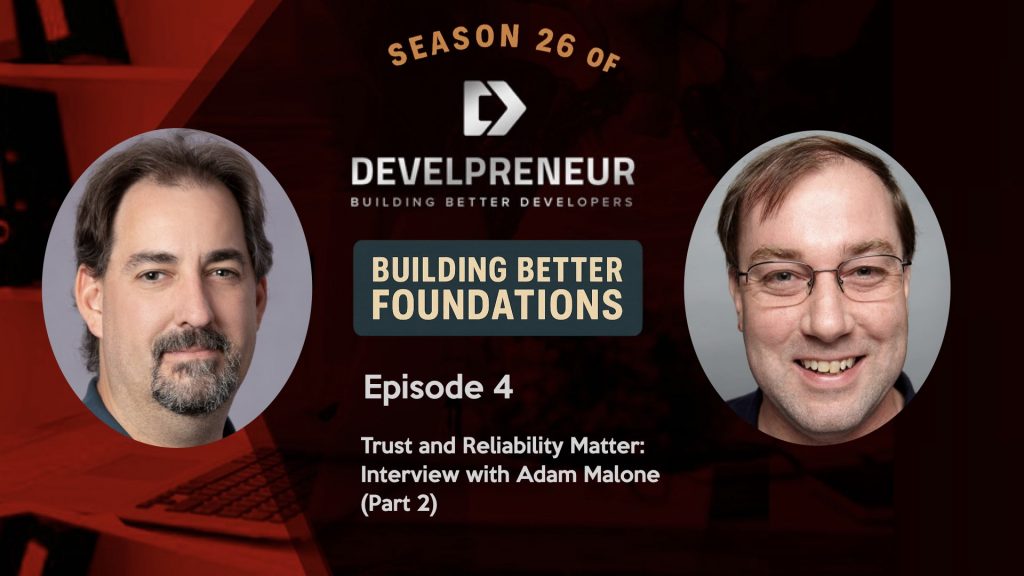In this episode of Building Better Developers, hosts Rob Broadhead and Michael Meloche continue their insightful conversation with Adam Malone, exploring how trust and reliability drive stronger teams and foster more robust customer relationships.
We pick up with Adam, who opens by emphasizing that reliability begins with consistency. Teams should revisit their guiding principles every couple of weeks—not just at the start of a project. These regular check-ins foster alignment, identify minor missteps early, and maintain clear priorities.
“Even if it feels repetitive, that one time someone speaks up can save weeks of rework,” Adam explains.
He adds, It’s not about being flawless. It’s about being consistent, accountable, and transparent—values that transform principles from words into action.
Reinforcing Reliability Through Shared Principles
Reliable teams share a standard compass. Adam recommends boiling down guiding principles to one or two clear slides so everyone can easily reference them during meetings.
When conflict arises, those principles provide the framework for productive discussions. Rather than asking who’s right, teams can ask: Does this decision align with our values?
“That constant reinforcement builds reliability,” Adam says. “It keeps everyone anchored, no matter who’s leading the conversation.”
This shared structure enables teams to make consistent, principle-driven decisions—an essential component of long-term reliability.
Extending Reliability to the Customer Experience
Michael then turns the discussion outward: how does this translate to the customer experience?
Adam explains that reliability for customers begins with a clear definition. Many organizations claim to deliver “great service,” but few define what that means in concrete, repeatable terms. Is it speed? Fairness? Empathy?
When teams clearly define those expectations—how to handle complaints, returns, or exceptional cases—they make it a measurable concept.
“We all own the customer experience,” Adam emphasizes. “It’s not one department’s job—it’s everyone’s responsibility.”
By conducting after-action reviews and evaluating whether customer interactions align with agreed principles, businesses ensure that it becomes a company-wide culture rather than a customer-service function.
The Three Elements of Reliability
Adam breaks reliability into three key elements that inspire trust: empathy, authenticity, and performance.
- Empathy – Customers recognize reliability when they feel heard. Confirming concerns and restating issues shows genuine care.
- Authenticity – True reliability requires sincerity. People can spot a scripted response immediately; being real always resonates.
- Performance – Reliability is proven when promises are met. Even small, predictable actions—like sending updates exactly when promised—reinforce credibility.
“Reliability is the visible form of trust,” Adam says. “It’s how people know we’ll do what we say.”
These principles work equally well for internal teams, turning accountability into culture.
Aligning Internal and External Reliability
Adam also shares how teams can connect internal with external outcomes. In his “out-of-the-box” sessions, team members from every department—engineering, operations, and customer service—gather to experience a product exactly as a customer would.
“Every process has a supplier and a receiver,” Adam explains. “Bringing them together helps everyone understand how reliability feels from start to finish.”
This hands-on approach highlights where it breaks down and how teams can collaboratively improve it. It bridges gaps between departments and strengthens the company’s overall dependability.
Reliability Through Early, Honest Conversations
Adam closes with one of the episode’s most memorable points: reliability thrives on honesty. Avoiding tough conversations damages trust.
“The argument’s going to happen eventually,” he says. “Like bad fish, it doesn’t get better with age.”
By addressing conflicts early, teams preserve transparency, reduce frustration, and maintain consistent reliability across every relationship—internal or external.
Final Thoughts
In this powerful continuation of their discussion, Adam Malone reminds listeners that reliability is more than a process—it’s a promise. From steady communication to authentic customer care, reliable organizations earn trust through consistent action.
Reliability is what transforms teams into partners and customers into advocates. It’s not built in a day—it’s proven every day.
Connect with Adam Malone
If you enjoyed this conversation and want to learn more from Adam, he’s always open to sharing insights and connecting with like-minded professionals.
- LinkedIn: Adam Malone on LinkedIn
- Website: http://thetenaciousoperator.com/
Visit him on LinkedIn and drop him a message to continue the discussion around leadership, reliability, and building consistent customer experiences.
Stay Connected: Join the Developreneur Community
We invite you to join our community and share your coding journey with us. Whether you’re a seasoned developer or just starting, there’s always room to learn and grow together. Contact us at [email protected] with your questions, feedback, or suggestions for future episodes. Together, let’s continue exploring the exciting world of software development.

